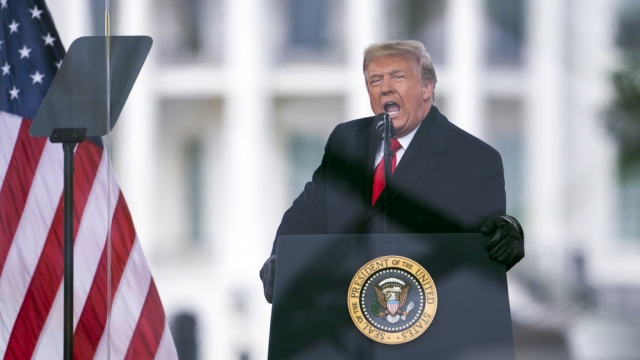Former President Donald Trump was indicted on Tuesday, August 1 in connection to scheme to overturn the 2020 presidential election.
While current President Joe Biden was determined to be the clear winner of the last U.S. presidential election, Trump claimed the election was "stolen," making a number of allegations that election officials cheated him.
The overwhelming majority of those claims were never accepted in court. As the former president was making the claims, the Department of Justice expressed its belief that, based on the indictment, Trump was making an effort to steal the election.
SEE MORE: Prosecutors charge Trump allies for illegal testing of voting machines
Here is a timeline of events leading up the additional indictment handed down at the start of August
Nov. 3, 2020
On Election Day in America polls showed it was a tight race between Joe Biden and Donald Trump. With the COVID-19 pandemic still gripping the country, and the expansion of mail-in voting, results were widely expected to take longer in some states to come in.
At the end of the night, a number of states remained too close to call. It was clear at the time that a winner of the election was going to take several days to be confirmed.
Nov. 5, 2020
Trump's campaign filed lawsuits to stop the counting of votes in Michigan as Biden had been determined to be the winner in that state.
Nov. 7, 2020
Biden becomes the projected winner of the presidential election, as enough ballots were counted in Pennsylvania to confirm his victory. Trump rejected the result, saying, "The simple fact is this election is far from over."
Meanwhile, Trump's allies held a news conference outside a Philadelphia-area landscaping business describing legal challenges they would make on behalf of Trump.
Dec. 14, 2020
At capitol buildings throughout the U.S., electors met to vote in the Electoral College.
Those results showed that across the country, Biden had 306 Electoral College votes compared to 232 for Trump. Two-hundred and seventy is the number needed to become president. Meanwhile, a group of "false electors" met at various locations throughout the U.S.
According to the Michigan Attorney General's Office, 16 Michiganders met covertly at the state's Republican headquarters. It was their hope, allegedly, that Vice President Mike Pence would throw out the slate of electors on behalf of Biden and accept the electors in support of Trump.
Jan. 2, 2021
Facing dwindling legal options prior to the certification of the Electoral College, Trump talked to Georgia Secretary of State Brad Raffensperger in a last-ditched effort to get election officials to change the result of the election.
"All I want to do is this. I just want to find 11,780 votes, which is one more than we have because we won the state," Trump told the officials in the phone call. Georgia was among a handful of states Biden won by a narrow margin.
Jan. 6, 2021
Congress meets to certify the results of the 2020 election, officially.
Trump attends a "Stop the Steal" rally outside of the White House. As the rally concludes, Congress meets to count the results of the Electoral College.
As Vice President Pence presided, hundreds of Trump supporters stormed the Capitol, causing members of Congress and Pence to go into hiding. After the process was disrupted, Congress reconvened and officially gave Biden the victory that night.
Nov. 15, 2022
Trump announces he is seeking a second term in the White House, hoping to become just the second person ever to become president in two non-consecutive terms.
Nov. 18, 2022
Attorney General Merrick Garland named Jack Smith the special counsel in charge of multiple investigations involving Trump, including the highly publicized classified documents probe.
Smith's appointment was a direct result of Trump's announcement days earlier. The Department of Justice has a long-standing policy of resisting political influence on investigations involving major political figures.
For instance, the Department of Justice appointed Robert Mueller to investigate Trump’s campaign's contacts with Russia and to what extent did Russian influence have on the 2016 election. Garland directed Smith to "conduct the ongoing investigation into whether any person or entity violated the law in connection with efforts to interfere with the lawful transfer of power following the 2020 presidential election or the certification of the Electoral College vote held on or about January 6, 2021."
March 30, 2023
A Manhattan grand jury voted to indict Trump for alleged hush-money payments to a porn actress. Manhattan District Attorney Alvin Bragg accused Trump of falsifying business records to cover up "hush money" payments to help his 2016 election campaign.
The indictment meant Trump became the first former president to ever be criminally indicted.
June 8, 2023
Trump was indicted again, this time in federal court, on 37 counts related to alleged mishandling of classified documents and blocking efforts to investigate the missing documents. The trial is expected to begin in May 2024.
July 18, 2023
Michigan Attorney General Dana Nessel filed charges against 16 individuals accused of multiple forgery charges.
August 1, 2023
Former President Trump was indicted on criminal charges related to an investigation into election interference. An indictment against him was handed down on Tuesday on charges connected to attempting to overturn presidential election results with at least seven U.S. states named. A charge of a ‘conspiracy to defraud’ the U.S. was also included.
Meanwhile, in Michigan, a former Republican attorney general candidate and another supporter of Trump were criminally charged in that state in connection to accessing and tampering with voting machines after the 2020 election.
Trending stories at Scrippsnews.com



